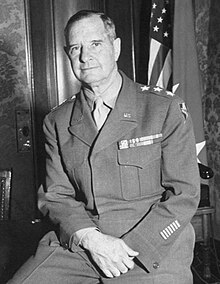Geoffrey Keyes
| Geoffrey Keyes | |
|---|---|
 |
|
| Born | October 30, 1888 Fort Bayard, New Mexico, United States |
| Died | September 17, 1967 (aged 78) Walter Reed Hospital, Washington, D.C., United States |
| Buried at | West Point Cemetery |
| Allegiance |
|
| Service/branch |
|
| Years of service | 1913–1950 |
| Rank |
|
| Unit |
|
| Commands held |
9th Armored Division II Corps Seventh Army Third Army |
| Battles/wars |
Pancho Villa Expedition World War I World War II |
| Awards |
Army Distinguished Service Medal (3) Legion of Merit Silver Star (2) Bronze Star |
Lieutenant General Geoffrey Keyes (October 30, 1888 – September 17, 1967) was a highly decorated senior officer of the United States Army who commanded II Corps during the Italian Campaign of World War II.
Keyes was born on October 30, 1888 in Fort Bayard, New Mexico, the son of Captain Alexander S. B. Keyes, a United States Army officer, and his wife, Virginia Maxwell Keyes. Like his father, Geoffrey enrolled as a cadet at the United States Military Academy (USMA) at West Point, New York on March 2, 1908 and graduated on June 12, 1913, being commissioned as a second lieutenant, into the Cavalry Branch of the U.S. Army. Among his fellow graduates were Charles H. Corlett, Alexander Patch and Willis D. Crittenberger. His first assignment was with the 6th Cavalry Regiment, where he served until October 1916 and participated in the Pancho Villa Expedition.
His next assignment was at the USMA, where he served as an instructor of French language. He was also head football coach for one season in 1917, compiling a record of 7–1. During World War I he served in the United States as an instructor at the USMA.
His interwar service included duty with Panama Canal Division as an Assistant Chief of Staff (G-3), instructor at the USMA and the U.S. Army Cavalry School at Fort Riley, Kansas and Chief of Supply of Supply Division within War Department. He also graduated from the U.S. Army Command and General Staff School in 1926 and the U.S. Army War College in 1937.
...
Wikipedia
